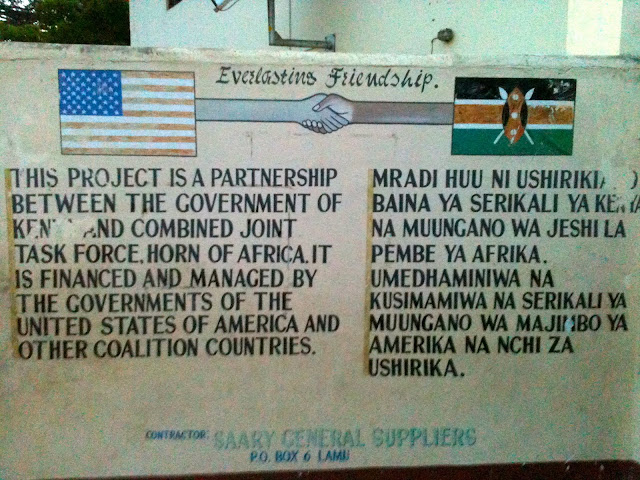So as we sit by the coast of Lamu in the Palace Hotel we meet a Swedish guy in his 50s. Andrew the Swede started to talk to us. After all the tomfoolery and a few irrelevant preliminary conversations he looked at me, said my name wrong and asked if he could ask me a question. I said sure with a look of "PLEASE DON'T SAY SOMETHING STUPID". (One is allowed to hope). He said, "I know what it's like to be white in Africa but what is it like to be Black in Africa?" I then gave him the why you say something stupid face. Noticing how stupid it sounds to ask a Black person/African what it feels like to be Black in Africa he said, "I mean being a Black American in Africa"which still isn't a better question. He saw the (white) privilege that I had and was surprised that I was Black and was wondering what it felt be the only black people in an all Black island to have just as much privilege as he.
The question should be reversed and should be furthered by asking why do some whites feel a need to come to "developing countries" just to feel superior, important, adequate or maybe even comfortable. A more interesting question would be "why do whites feel so comfortable in a place where they are the minority/ what are you doing in Africa?
I wish I could have answered Swedish Andrew with my experience in the coming day
So either this is EXACTLY how a terrorist looks or they were singling out Cheickna and I as soon as we landed in Malindi. Apparently when we were waiting for our plane in Lamu to Malindi amongst only/majority whites "someone" pointed out the two darkest brothers on the thirty passenger plane as "suspicious". So when we landed we were greeted by "authorities" (one guy with an AK 47 and the other with a serious look and bad pronunciation of our names.) We were asked for our passports. Cheickna was furious. In a Muslim nation we were suspicious because we were wearing a hat (Kofia). 40 minutes of our life wasted in trying to prove that Cheickna and I are not terrorist with American passports. It didn't help that my passport states that I was not American born, our names were both West African and we claimed to be American (good thing we had an "American Accent") nor did it help that Cheickna and I have the EXACT same birthday except I'm one year older.
He wrote down all the info on our ID's and Passports but then his superior comes in and says that they need a photocopy of our passport but they didn't have a scanner or any means of coping it there. So the Academic Director, Cheickna and I had to go to a store and get a copy while he followed on a motocycle. We gave him the copy and he said, "sorry brothers we too are muslim but we must do our jobs."
So, what's it like to be conscious in the Black Continent? It's frustrating to see the "others" who have shaped a place that's not theirs so much so that till this day they feel entitled to come and go as they please. While locals cant move around as freely because they don't have the money that the "others" have amassed doing god knows what. To the the point that "locals" look out of place in their own space. Europeans and other westerners use Africa as an "under developed Las Vegas" where their money goes even further. They are addicted, fasinated, and obssesed with Africa so they take advantage of the sad situations in Africa that was instigated by colonialism and now by business and Neo-Colonialism. Jomo Kenyatta opened up Kenya to the Westerners after independence as if he forgot the struggle and lives lost to attain independence from England. An Independence that was done through much bloodshed ie Land Freedom Army (falsely labeled Mau Mau).
I guess there is a reason why whites settled in Kenya during colonialism and dubbed the name, "White Man's Land". Maybe someone should pull out a map and point out Europe.








































